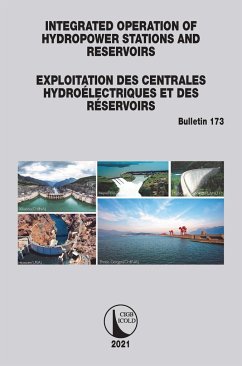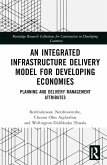Integrated operation of hydropower stations and reservoirs has become a trend of hydropower exploitation, as an effective technical measure, integrated operation can improve the utilization efficiency of water resources, reduce the risks of flood and drought disaster, increase the safety and stability power grid and make sure that hydropower stations and reservoirs operate in an appropriate and economical way. This bulletin gives an overview of the main functional and operational aspects relating to cascade hydropower stations and reservoirs, it was formed by reviewing of all the related aspects proposed and case studies provided by committee members. It collected and sorted out operation modes and practical experiences of hydropower stations and reservoirs in ICOLD member countries, summarized the feasibility measures, benefit evaluation methods and system platform construction of hydropower stations and reservoirs with comprehensive benefits, and shared case studies from 10countries, including Brazil, China, France, Iran, Japan, Korea, Nigeria, Russia, Switzerland and USA.
L'exploitation intégrée des centrales hydroélectriques et des réservoirs est devenue une mesure technique efficace de l'exploitation hydroélectrique. L'exploitation intégrée peut améliorer l'efficacité d'utilisation des ressources en eau, réduire les risques de catastrophe, d'inondation et de sécheresse, augmenter la sécurité et la stabilité du réseau électrique et faire fonctionner les centrales hydroélectriques et les réservoirs de manière appropriée et économique. Ce bulletin donne un aperçu des principaux aspects fonctionnels et opérationnels relatifs aux centrales hydroélectriques et réservoirs en cascade. Il passe en revue tous les aspects connexes proposés et des études de cas fournies par les membres du comité. Il rassemble les modes de fonctionnement et les expériences pratiques des centrales hydroélectriques et des réservoirs dans les pays membres de la CIGB. Il résume les mesures de faisabilité, les méthodes d'évaluation des avantages et la construction de plates-formes de systèmes de centrales hydroélectriques et de réservoirs avec des avantages complets. Il bénéficie des expériences et des études de cas de 10 pays, y compris Brésil, Chine, Corée, France, Iran, Japon, Nigéria, Russie, Suisse et USA.
L'exploitation intégrée des centrales hydroélectriques et des réservoirs est devenue une mesure technique efficace de l'exploitation hydroélectrique. L'exploitation intégrée peut améliorer l'efficacité d'utilisation des ressources en eau, réduire les risques de catastrophe, d'inondation et de sécheresse, augmenter la sécurité et la stabilité du réseau électrique et faire fonctionner les centrales hydroélectriques et les réservoirs de manière appropriée et économique. Ce bulletin donne un aperçu des principaux aspects fonctionnels et opérationnels relatifs aux centrales hydroélectriques et réservoirs en cascade. Il passe en revue tous les aspects connexes proposés et des études de cas fournies par les membres du comité. Il rassemble les modes de fonctionnement et les expériences pratiques des centrales hydroélectriques et des réservoirs dans les pays membres de la CIGB. Il résume les mesures de faisabilité, les méthodes d'évaluation des avantages et la construction de plates-formes de systèmes de centrales hydroélectriques et de réservoirs avec des avantages complets. Il bénéficie des expériences et des études de cas de 10 pays, y compris Brésil, Chine, Corée, France, Iran, Japon, Nigéria, Russie, Suisse et USA.








